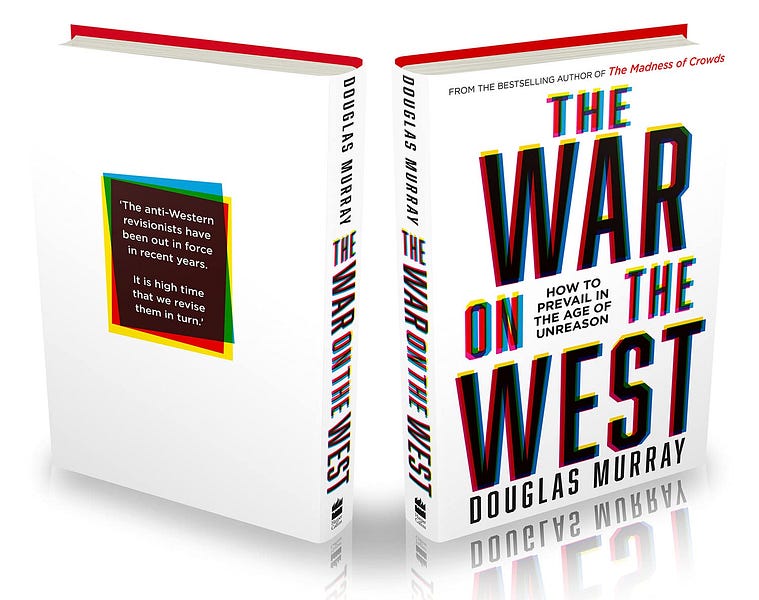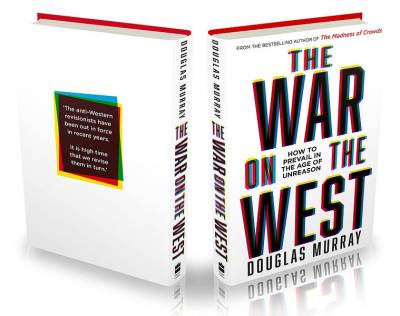Douglas Murray’s The War on the West is the culmination of a trio of books cataloging how anti-Western philosophy has sought to attack the political and societal foundations underpinning the United States and Western Europe. The Strange Death of Europe (2017) provides a detailed account of how European politicians encouraged mass immigration without thinking through its consequences, and Murray’s previous bestseller The Madness of Crowds (2019) is a damning critique of intersectionality and social justice politics. In his newest title, Murray asks how and why it became fashionable to attack Western politics and culture for being nothing more than the racist product of a bunch of “dead white males.”
In the introduction, Murray explains how racial issues in the West are like a “pendulum that has swung past the point of correction and into overcorrection.” One of the biggest philosophical strengths of his book is that it highlights the absurdity of doctrines like critical race theory and Marxism without trying to swing the pendulum too far back the opposite way. At many points, Murray recognizes the ugliness of colonialism and slavery. The book simply calls attention to the unfair standard applied to Western culture, where racist sins are exaggerated and human rights advances minimized. In addition, Murray is willing to question some of the assumptions of antiracist politics—for example, the notion that every industry will necessarily benefit from mandated diversity quotas.
In many ways, Murray’s book can be divided into two main narratives: one praising the best of Western civilization and the other cataloging how the building blocks of that same civilization (specifically ethnicity, culture, history, and religion) are under attack. In his section on culture, for example, Murray devotes significant time to discussing works by two 20th-century British artists—the painter Rex Whistler and the composer Michael Tippett—whose work he clearly admires. He then describes how both men have come under fire recently: Whistler for a depiction of a child slave in one corner of an expansive mural and Tippett for “appropriating” African American spiritual songs in a famous oratorio. Does hiding away the artistic masterpieces of previous generations help advance racial equality, Murray asks, or is it merely an unapologetically hostile form of censorship, where the works of past Western creators must necessarily be either narrow and exclusionary or prejudiced and appropriative?
Throughout the book, Murray does a superb job pointing out the broader hypocrisies of those who attack the West. Why is it that those who seek to cancel David Hume and John Stuart Mill for their alleged racial insensitivity avoid discussing the explicit racism of Karl Marx? Why do people toppling Thomas Jefferson statues ignore the fact that Michael Foucault, the world’s most cited scholar on sexuality and power, himself raped Tunisian children? The answer, Murray explains, has less to do with an objective moral lens than with many activists’ willingness to prop up any historical figure who attacked Western civilization.
Murray’s dry sense of humor makes his book impossible to put down. For example, in his discussion of classical music, Murray discusses how leading conservatories responded to the 2020 racial justice protests. In particular, he describes how officials at the Royal Academy of Music in London announced they would reviewing the institution’s historical connections with the composer George Frederic Handel, who invested in a slave owning company, and “decolonizing” their collection of pianos made with colonial ivory. “Nobody knows what was going through the mind of George Floyd during the last terrible minutes of his life,” Murray wryly notes. “But it might have surprised him to learn that his death could lead to a purge of historic harpsichords at one of London’s premiere conservatories.”
If there is any critique to be made of The War on the West, it is that Murray never conclusively answers an underlying question: Is it okay to view politics and society through an explicitly racial lens? At many points, Murray condemns the idea that people can be lumped together simply based on their skin color and expresses concern that racist rhetoric has been mainstreamed through ideas such as critical race theory. In the conclusion, however, Murray offers his “nuclear answer” to anti-white racism, an essay that praises the achievements of previous white politicians, academics, artists, and scientists. Murray is free to offer his own interpretation of Western history but casting it in racial terms is an odd way to respond to people he criticizes for doing the exact same thing.
In The War on the West, Douglas Murray poses a simple question to people who criticize Western democracies for being uniquely racist: “Compared to what?” At a time when China is seeking to supplant the Western liberal order, this is a question worth asking, both because it shows the historical baselessness of the claim and pushes back against the idea that Western countries have no moral legitimacy to act anywhere. As Murray memorably puts it, “The anti-Western revisionists have been out in force in recent years. It is high time that we revise them in turn.”







Please note that we at The Dispatch hold ourselves, our work, and our commenters to a higher standard than other places on the internet. We welcome comments that foster genuine debate or discussion—including comments critical of us or our work—but responses that include ad hominem attacks on fellow Dispatch members or are intended to stoke fear and anger may be moderated.
With your membership, you only have the ability to comment on The Morning Dispatch articles. Consider upgrading to join the conversation everywhere.